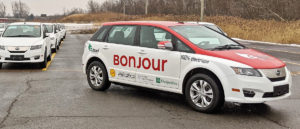E-taxi, a start-up backed by China EV giant BYD, is hitting the road with a proven vehicle and a unique lease-to-own pitch to drivers

An E-Taxi BYD e6 vehicle on arrival day in Montreal last week. Photo: L’Orange bleue
E-Taxi, a start-up backed by China EV giant BYD, is hitting the road with a proven vehicle and a unique lease-to-own pitch to drivers
Less than a year after the shutdown of Téo Taxi, an app-based electric vehicle taxi service, a Montreal start-up has started rolling out a new electric fleet for the city’s taxi industry.
On Dec. 2, E-Taxi, an electric taxi importer based in Montreal, announced the arrival of 25 e6 model taxis from BYD, the giant EV manufacturer based in China, and said that they were now in the hands of taxi drivers around town.
E-Taxi was created in 2018. Its founders, Yung and Fabien Cuong, say they hope to make their product accessible and attractive to drivers, along with fixing the past mistakes of other companies.
The latter is a reference, no doubt, to Téo, which declared bankruptcy in January, laying off more than 450 drivers and shelving more than 190 electric taxis.
Strictly an importer
Unlike Téo, which was a taxi operator owned by industry consolidator Taxelco, E-Taxi is strictly a vehicle importer. Significantly, its backers include BYD and, according to an article in LaPresse, the Vancouver-based Jim Pattison group.

In a translation from the LaPresse story, Fabien Cuong says, “we help finance drivers who want to exchange their taxi for an electric vehicle that will reduce their polluting emissions, and that will save them from the first year of entry into service.”
The cost of the car is $63,000. E-Taxi offers a weekly lease-purchase payment plan of $250, which takes into account the province’s $8,000 EV purchase incentive and a further $8,000 in tax assistance, as well as the federal rebate of $5,000.
E-Taxi also provides drivers with a taxi meter and mobile device to track and take customer payments and offers a five-year/500,000-kilometre warranty.
Immediate savings
The company says it expects drivers to start realizing savings compared to the cost of running gasoline-power taxis by the end of their first week with the vehicles. Fabien Cuong says this is because instead of paying both car rental payments and gas, they are just making a payment to own.
BYD’s e6 taxi model, launched in 2009, has a lengthy track record in other countries. It has an 80 kWh lithium-iron-phosphate battery and takes as little as 40 minutes to fully charge.
E-Taxi hopes to bring 2,000 more taxis to Canada within the next two years. It could soon face more electric competition, however. Earlier this year, Quebec business mogul Pierre Karl Péladeau bought Taxelco — which, in addition to holding the assets of the defunct Téo, operates about one-third of Montreal’s conventional taxi business — and in July pledged to convert 1,500 ICE vehicles in its fleet to EVs.






